This is a free Google SWOT analysis available for all students. You should use it only as a reference.
Company Details
| Parent organization: | Alphabet Inc. Trending |
| CEO: | Sundar Pichai (Oct 2, 2015–) |
| Founded: | September 4, 1998, Menlo Park, California, United States |
| Headquarters: | Mountain View, California, United States |
| Subsidiaries: | YouTube, Dialogflow, Kaggle, Google AdMob, Looker,… |
| Founders: | Larry Page, Sergey Brin |
Google was founded by Stanford students in 1998. Only a decade later, it became one of the most successful and valuable brands in the world. Today, Google is the default search engine with diverse products and services.
In the internet sphere, there is no real competition for Google as its competitors fall way below its percentage in this segment. During and after the pandemic, the company is enjoying a high tide of adoption and user interest in its services.
Do you need an excellent SWOT Analysis of Google? We can help you with that! Our researchers can produce Google’s SWOT Analysis with amazing accuracy and useful insights. Connect with us now!
SWOT Analysis of Google
Through SWOT Analysis, researchers can determine underlying internal and external factors a company might be facing. This allows them to answer business questions and even serve as a forecast for the health and performance of the company.
SWOT Analysis is about investigating and researching a technology company’s strategic planning, Google in this case. It is usually presented in a square form with four quadrants to house relevant information in each one of them.
SWOT Table is another way to display all the key information in the analysis in an easy-to-follow manner.
Google Internal Factors
Internal factors are comprised of strengths and weaknesses. Before we explore Google’s external factors, let’s dissect the internal factors, one by one.
💪 Strengths
Anything that gives a company a comparative advantage over its competitors is called strength. In the case of Google, the following are some of the salient strengths.
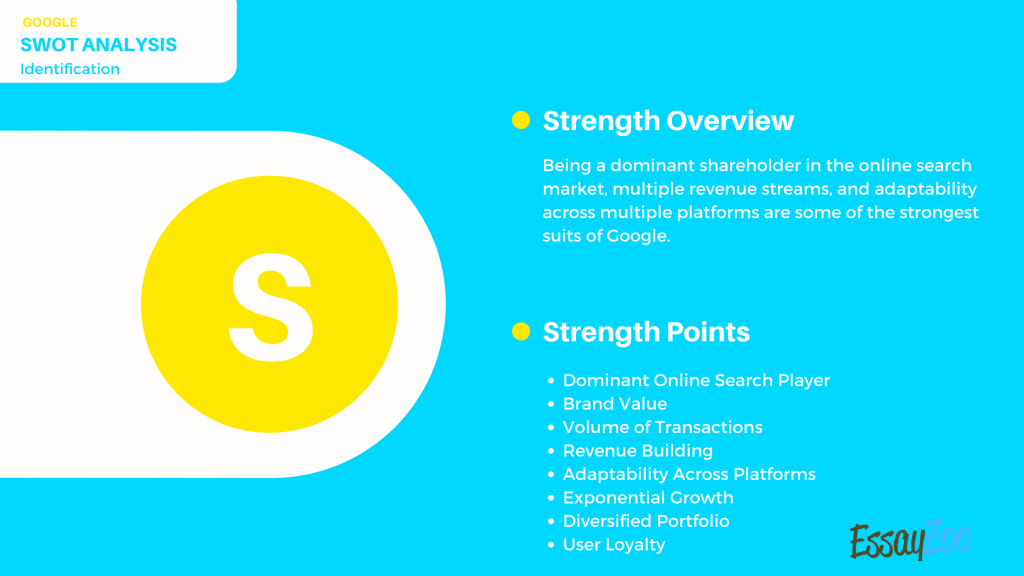
Dominant Online Search Player
In the online search engine market, no competitor of Google is even closer to the software giant. According to some statistics, Google has over 85% market share in this market segment.
Other names including Yahoo and Bing seem minor players in the presence of Google.
Brand Value
With that much success and revenue generation, it is only natural that Google is considered one of the topmost valuable brands in the world. According to Forbes, only Apple stands before Google in the first position.
In terms of market cap, the brand is valued at over 1.5 Trillion.
Volume of Transactions
On average, Google processes over 40,000 search queries globally per second. This is equivalent to over 3.5 Billion queries and search requests processed. Being the top online traffic generator in the world, Google smokes the competition out of the water, including Bing, Yahoo, Baidu, etc., to become the biggest online search engine.
Revenue Building
Through rigorous advertisement building and growth, Google has managed to ensure its revenue streams with immense returns from advertisements and Google Play Store. For FY 2019, the company reported over $160 billion in revenue.
Adaptability Across Platforms
Google was, and still is, one of the pioneers in adapting cross-platform technologies in its products and services.
Exponential Growth
If someone is looking for a company with truly exponential growth, through mobile and android technologies, then Google is a living example. Since its inception, it has grown tremendously from a small-time start-up to an internet mammoth.
Diversified Portfolio
From wearable technology to internet search, including Google Search and Google Maps, and hardware programs, Google has successfully transformed itself into a modern ecosystem.
User Loyalty
A user base of over 86% in the internet search market shows that Google has the highest numbers in user loyalty and retention.
🤒 Weaknesses
No company is without any loose links in its chain. In the case of Google, many weaknesses are not allowing the company to work at its optimum level.
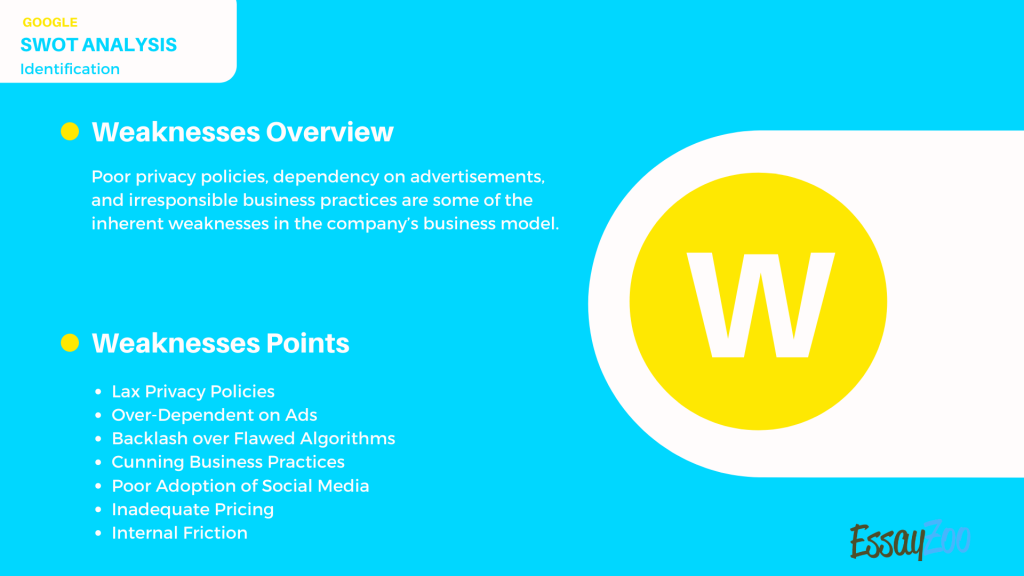
Lax Privacy Policies
Being the most dominant player in the market, Google is often slammed by critics for its lax privacy policies, including veiled data information about algorithms.
Over-Dependent on Ads
Like Facebook, Google is heavily dependent on its advertisement for revenue generation. In many fiscal years, the company depends over 80% of its revenue on advertisements.
Backlash over Flawed Algorithms
Many brands and individuals threatened to boycott Google when they found out that their advertisements and marketing materials were displayed on pages with extremist content.
Even the British Government was among the entities that forced Google to amend its algorithms.
Cunning Business Practices
Being the best player and most dominant player in the market, Google is found to practice malicious business practices to curb the entrance of new players into the online search market.
Poor Adoption of Social Media
Being a pioneer in the internet of things, Google failed to adopt social media platforms. Many new players have come and emerged in the market including TikTok in the short video format.
Inadequate Pricing
Google also offers a premium YouTube TV service to its users through its various platforms. In the competition with other companies, such as Netflix and Disney+ are offering better pricing options to users.
Internal Friction
Lately, employees have been showing distrust in the employer through unrest and protests. In June 2020, hundreds of employees protested against the company’s policies in offering G Suite applications to the police department against BLM protests.
Google External Factors
External factors include both opportunities and threats that can transform the business model and operations of the business for better or for worse.
🤑 Opportunities
Opportunities provide windows for businesses to grab user markets and revenue streams to solidify their presence and future security.
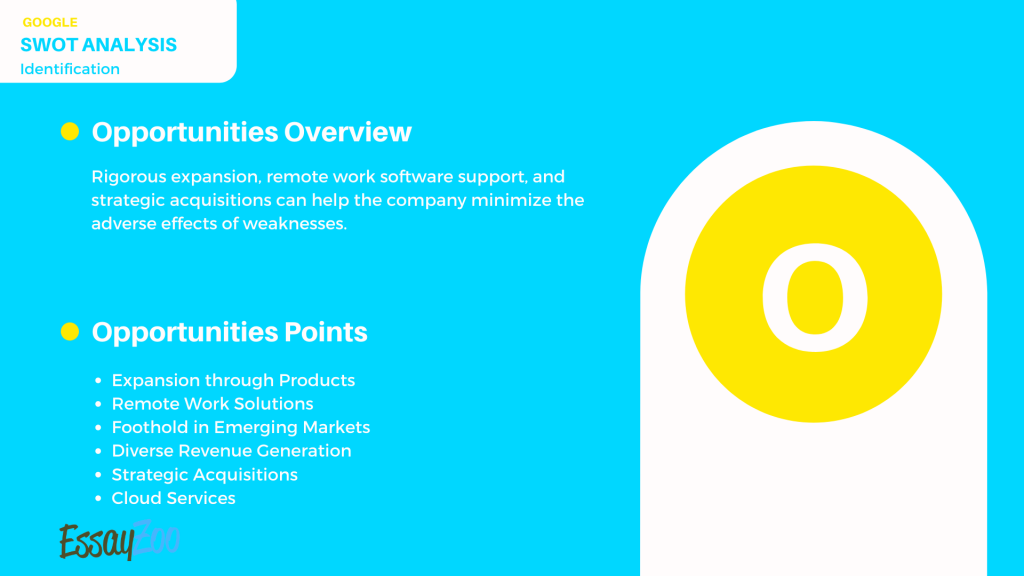
Expansion through Products
Google is aware of the mounting competition from other companies like Apple and Samsung. It is planning to enter the wearable market by acquiring Fitbit for $2.1 Billion. Google Glasses are also in development for quite some time.
In addition to this, Android OS is another strong suit for generating revenue for the company.
Remote Work Solutions
During and after the pandemic, Google can introduce new business solutions and productivity software to facilitate both in-house teams and remote workers, such as file management and video calling services.
Foothold in Emerging Markets
Google took the initiative to provide mobile 4G internet services to Kenya through air balloons. Also, by expanding its footprint in the emerging markets in terms of products and services, Google can diversify its revenue streams.
Diverse Revenue Generation
Google is strictly dependent on online advertising revenue. For now, this could be a point of strength for the company. In the meantime, it needs to explore new and diverse avenues for revenue generation to secure strong cash flow sources.
Strategic Acquisitions
Google can benefit a lot by acquiring existing players in diverse online markets to improve its both short and long-term gains.
Cloud Services
By collaborating with MobileIron, Inc., an online app distribution company, Google Cloud Platform is stepping into the online app development and distribution segment. Again, this will help the company in capturing market gains in storage and cloud solutions.
😨 Threats
These are potentially red flags that could be seriously harming a company. In the case of Google, there are a lot of threats that the internet giant is facing.
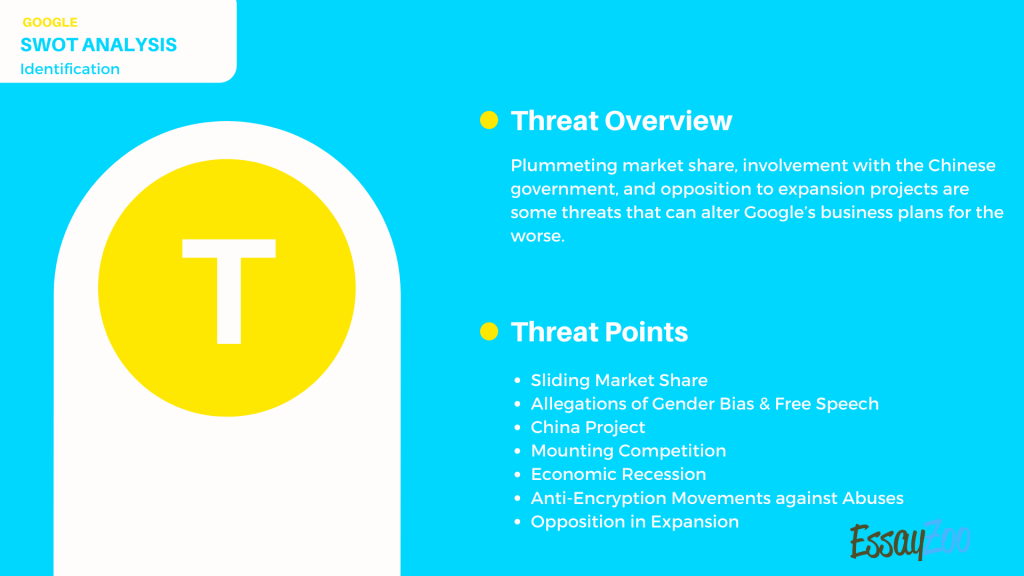
Sliding Market Share
Many credible sources are stating that Google’s market share in ad-related revenue is likely to drop in the coming years. Since the company is dependent on its revenue from advertisements, this is an alarming situation for Google.
Allegations of Gender Bias & Free Speech
Leaks and memos published by former or current employees of Google are shedding ample light on the culture of gender bias and declining free speech in the company.
China Project
Google faces a lot of backlash from many quarters over its alleged role in the development of a censored search engine. The Chinese government was its supposed partner.
Mounting Competition
In the advertisement realm, Google is facing a hard time due to Facebook and Amazon. Their incremental growth and rising market share in the industry will prove detrimental to the revenue generation and growth of the company.
Economic Recession
Since 2008, Google has seen tremendous growth in its ad revenue. Due to the pandemic and the looming economic uncertainty, Google has lost over 5% of its revenue.
It is indeed one of the most threatening factors for Google’s sustainability and growth.
Anti-Encryption Movements against Abuses
Google has time and time again vowed to relax its encryption policies to curb rampant child abuse and other sexually charged material over the internet. Yet, the company has to produce a road map or act on those vows made with rights groups and activists.
Opposition in Expansion
Due to brewing political tensions, Google had to abandon a lot of international projects and expansion programs. If the condition persists, then the company could face an extreme decline in growth.
Google SWOT Table
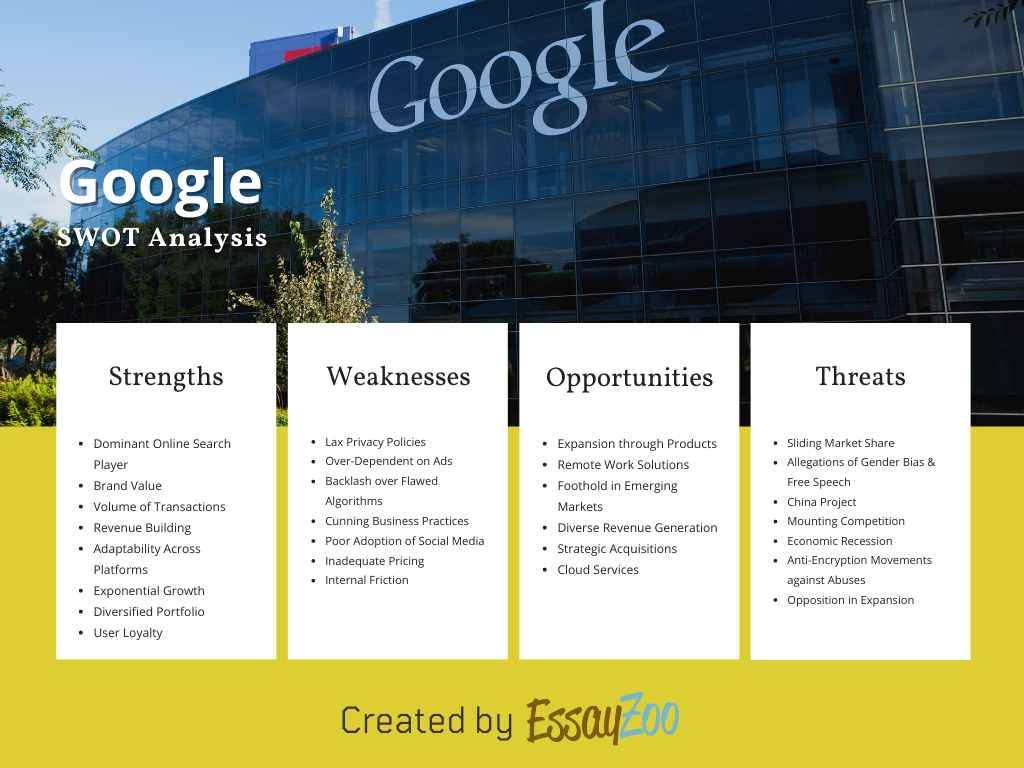
Strengths
- 💪 Dominant Online Search Player
- 💪 Brand Value
- 💪 Volume of Transactions
- 💪 Revenue Building
- 💪 Adaptability Across Platforms
- 💪 Exponential Growth
- 💪 Diversified Portfolio
- 💪 User Loyalty
Weaknesses
- 🤒 Lax Privacy Policies
- 🤒 Over-Dependent on Ads
- 🤒 Backlash over Flawed Algorithms
- 🤒 Cunning Business Practices
- 🤒 Poor Adoption of Social Media
- 🤒 Inadequate Pricing
- 🤒 Internal Friction
Opportunities
- 🤑 Expansion through Products
- 🤑 Remote Work Solutions
- 🤑 Foothold in Emerging Markets
- 🤑 Diverse Revenue Generation
- 🤑 Strategic Acquisitions
- 🤑 Cloud Services
Threats
- 😨 Sliding Market Share
- 😨 Allegations of Gender Bias & Free Speech
- 😨 China Project
- 😨 Mounting Competition
- 😨 Economic Recession
- 😨 Anti-Encryption Movements against Abuses
- 😨 Opposition in Expansion
Read Also:
- Chick-fil-A SWOT Analysis [2022]
- SWOT Analysis for Netflix – Free Example
- Strategic SWOT Analysis of Tesla
- Zara SWOT Analysis Essay
- A SWOT analysis for Johnson & Johnson’s company
- UPS SWOT Analysis In 2022
- Walmart SWOT 2022
- Amazon SWOT Analysis 2022: A Detailed Report
- Starbucks SWOT Analysis 2022
- Informative SWOT Analysis of Airbnb
- SWOT Analysis of Facebook
- Swot Analysis of McDonalds’s Current Situation
- Samsung: Strengths, Weaknesses, Opportunities, Threats
- Toyota SWOT Analysis
- Best SWOT Analysis of Nike
- Coca Cola Company: SWOT Analysis
- In-Depth SWOT Analysis of Disney
- Strengths, Weaknesses, Opportunities, and Threats of Dunkin Donuts
- Comprehensive SWOT Analysis of Apple
- Free Burger King SWOT Analysis
- SWOT Analysis: Procter & Gamble








